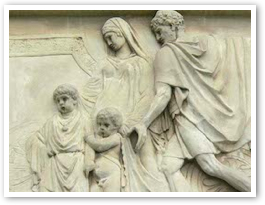Roman Cruelty, Christian Purity
- MIKE AQUILINA
It was Christian morality, and the evident love of Christian families, that gradually converted the Roman Empire.
 Spiritual writers, since the dawn of Christianity, have observed that impurity and cruelty arise as sibling vices in the soul. The elder is impurity, which reduces other people first to mere means of sensual satisfaction, and then to mere objects of sport.
Spiritual writers, since the dawn of Christianity, have observed that impurity and cruelty arise as sibling vices in the soul. The elder is impurity, which reduces other people first to mere means of sensual satisfaction, and then to mere objects of sport.
It's as true of cultures as it is of souls. Consider Rome of the late first and second century A.D. — but don't judge by what you see in museums. Be grateful, instead, that today's curators have some sense of decorum.
For the remains of imperial Rome are overwhelmingly pornographic. The walls of Pompeii are shocking because the volcanic ash preserved them in lurid color, but their motifs are little different from those that appear on common vases, lamps, and jewelry of the time. The homes of the bourgeois were little different, in decoration, from the common rooms of the brothels.
Families seemed unwilling or unable to preserve the innocence of children. Those who sent small boys to school assumed that the tutors would molest them. With limitless leisure time and no supervision, teenaged boys roamed the streets in gangs. They passed time in mischief, homosexual activity and, now and then, by raping a prostitute.
Girls were married off at age 11 or 12 to a mate much older, and not of their choosing. "Friends" celebrated the wedding by singing bawdy songs. "The wedding night," writes the French historian Paul Veyne, "took the form of legal rape."
Marital custom meant that the newlywed girl could look forward to a predatory relationship, rife with sodomy, abortion, and contraception. Adultery was expected of men. Infanticide was common, especially for female offspring. In one city of the empire, the census enrolled 600 families — of which only six had raised more than one daughter. Though most of those were large families, they had routinely killed their baby girls. In another city, a recent archeological dig turned up an ancient sewer clogged with the bones of hundreds of newborns.
But if marriage grew too miserable, at least divorce was easy. All it took was for one party to leave home with the intention of divorcing. Divorce took effect ex opere operato.
All of these mores were reflected in popular entertainment — the music business and the theatre. And when Romans tired of sex, they flocked to the circus to see criminals tortured and killed, by beasts or by gladiators. The gladiators drew life's blood from one another for the crowds.
What drew these weary citizens to the Church was the paradox evident in the family life of Christians, who were chaste, but who had found peace.
That's the world where the first Christians raised their families. You might call it a culture of death.
Yet Christians immediately set themselves apart. They took no part in the impurity or cruelty. We have many sermons and tracts from those years, condemning the grossness of the theatre, the sickness of the circus, and the bedroom behavior of ordinary Romans. But what is more remarkable is the testimony of the pagans themselves.
The Romans were frankly astonished by the Christians, for the Christians routinely achieved something the Romans had thought impossible. Christians preached and practiced a range of virtues that involved sexual continence — chastity, purity, and even lifelong celibacy. The great pagan physician Galen wrote: "Their contempt of death is patent to us every day, and likewise their restraint in cohabitation. For they include not only men but also women who refrain from cohabiting all their lives; and they also number individuals who, in self-discipline and self-control, have attained a pitch not inferior to that of genuine philosophers." Even most stoics, who supposedly despised human passion, believed that passions were best quelled by indulgence.
But even married Christians strove for chastity and true love. "They marry, as do all others; they beget children; but they do not commit infanticide. They share a common table, but not a common bed."
It was Christian morality, and the evident love of Christian families, that gradually converted the Roman Empire.
The brothels had exercised a certain attractive power over Rome, but the brothels did not satisfy. Restless pagans had indulged their cruelest blood lusts at the circus, but the circus did not satisfy.
What drew these weary citizens to the Church was the paradox evident in the family life of Christians, who were chaste, but who had found peace.
 This is Meaghen Gonzalez, Editor of CERC. I hope you appreciated this piece. We curate these articles especially for believers like you.
This is Meaghen Gonzalez, Editor of CERC. I hope you appreciated this piece. We curate these articles especially for believers like you.
Please show your appreciation by making a $3 donation. CERC is entirely reader supported.

Acknowledgement
 Mike Aquilina. "Roman Cruelty, Christian Purity." Lay Witness (January/February 2005):56.
Mike Aquilina. "Roman Cruelty, Christian Purity." Lay Witness (January/February 2005):56.
This article is reprinted with permission from Lay Witness magazine. Lay Witness is a publication of Catholic United for the Faith, Inc., an international lay apostolate founded in 1968 to support, defend, and advance the efforts of the teaching Church.
The Author

 Mike Aquilina is vice president of the St. Paul Center for Biblical Theology. He is the author or co-author of fifty books including A History of the Church in 100 Objects, Seven Revolutions: How Christianity Changed the World and Can Change It Again, Yours is the Church: How Catholicism Shapes Our World, Good Pope, Bad Pope: Their Lives, Our Lessons, Love in the Little Things: Tales of Family Life, Living the Mysteries: A Guide for Unfinished Christians, Fathers of the Church: An Introduction to the First Christian Teachers, The Way of the Fathers: Praying with the Early Christians, and Praying in the Presence of Our Lord: With St. Thomas Aquinas. With Cardinal Donald Wuerl, he is the author of The Church: Unlocking the Secrets to the Places Catholics Call Home, and The Mass: The Glory, the Mystery, the Tradition. See Mike Aquilina's "The Way of the Fathers" blog here.
Mike Aquilina is vice president of the St. Paul Center for Biblical Theology. He is the author or co-author of fifty books including A History of the Church in 100 Objects, Seven Revolutions: How Christianity Changed the World and Can Change It Again, Yours is the Church: How Catholicism Shapes Our World, Good Pope, Bad Pope: Their Lives, Our Lessons, Love in the Little Things: Tales of Family Life, Living the Mysteries: A Guide for Unfinished Christians, Fathers of the Church: An Introduction to the First Christian Teachers, The Way of the Fathers: Praying with the Early Christians, and Praying in the Presence of Our Lord: With St. Thomas Aquinas. With Cardinal Donald Wuerl, he is the author of The Church: Unlocking the Secrets to the Places Catholics Call Home, and The Mass: The Glory, the Mystery, the Tradition. See Mike Aquilina's "The Way of the Fathers" blog here.




